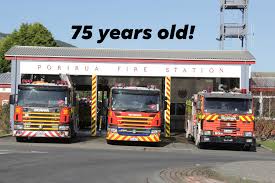
A controlled burn done by Fire & Emergency NZ for television illustrates just how quickly a home can take light. – FIRE AND EMERGENCY NZ
You’ve heard the urban myths about domestic appliances bursting into flames and consuming their owner’s houses – but a quick look at the facts shows that the real culprit is likely to be the humans who use them.
Statistics from Fire & Emergency NZ show that in the last five years, 294 fires were caused by “failures to clean” (for example, forgetting to clean the lint out for your dryer), 284 fires were caused by people putting “combustible” things too close to the heater, and 258 were from the careless disposal of cigarettes, embers or ash. Unattended cooking still reigned supreme however, coming in at 893 occurrences.
We’re tired when we get home from work, we’re desperate to get warm, we get bored or distracted – we’re only human. It’s easy for the sensible precautions to go in the “too hard” basket.
If the principal advisor of fire risk management for the Auckland region, Mike Shaw, could drive any message home about fire safety and appliances, it would be simply to always read the instructions.
Here’s a common sense rundown for home appliances that Fire & Emergency NZ would like us to keep in mind.
DRYERS

It’s been said before and we’ll say it again – don’t leave your dryer running when you go out. – JANE USSHER/NZ HOUSE & GARDEN
Static electricity and build up of heat can cause dust, lint and chemical residue on clothing to catch fire.
If you’re a regular user of hair or massage oil, your towels can pose a particular fire risk.
“Over time the oils become impregnated into the fabric,” said Shaw. It doesn’t take much for these to catch light, especially if your dryer doesn’t have an automatic-off switch.
DISHWASHERS

Stacking your dishwasher correctly really is an art – and an important safety measure.
A dishwasher bursting into flames seems like an oxymoron, but what this is most often caused by is poor stacking.
“If you load a small plastic lid into a large slot and it falls through the cage onto a heater element during the drying cycle, it will catch fire,” said Shaw.
MICROWAVES

When you are planning a kitchen, leave space around your microwave. – RESENE
The biggest problem with microwave fires, other than improper things being put inside (we all know cutlery is a no-no) is smothering the extractor fans.
“You need an area around the device,” said Shaw.
So if you’re building a new kitchen and intend on including a microwave, make sure to factor in enough space around it. In an existing kitchen, though tempting, don’t try to make it look cute by stacking with cookbooks or knick-knacks, it could be your undoing.
TOASTERS

Toasters put out a lot of heat so if you store it in an enclosed area, pull it out into the open before use. – JACKIE MEIRING/NZ HOUSE & GARDEN
Obviously due to the nature of a toaster, there’s going to be a lot of hot air coming out the top. Don’t run your toaster inside a cupboard or underneath a shelf or bench.
Amelia Macandrew, Customer Relations Manager, AA Insurance, recommends playing it safe and keep your toaster turned off at the wall when you’re not using it.
“Turn off all non-essential electrical appliances at the wall before you go to bed or work,” she said.
DVD PLAYERS, SKY-BOXES AND GAME CONSOLES

Televisions and DVD players need room to ventilate so don’t stack things on them. – RESENE
Consider this just one more reason why playing Xbox all night is a bad idea. Extended use causes devices like this to heat up.
“Things like DVDplayers and sky-boxes have vents which shouldn’t be covered,” said Shaw.
Apply the microwave principles above and go to bed for goodness’ sake.
HAIR STRAIGHTENERS

Hair dryers are quite a common cause of domestic fires.
Make a habit of unplugging it from the wall when you’re done.
SLOW COOKERS AND OVENS

Slow cookers are handy and make delicious food, just make sure to use it correctly. – MARION VAN DIJK/STUFF
Shaw is a fan of slow cookers like many of us and said dangers with such a device will relate to how it is used. It’s fine to set and forget your slow cooker, but make sure that it is set up on a clear bench and not sitting on its own cord.
However tempting, it is not recommended that ovens are left on while you pop to the shops.
OIL COLUMN HEATERS AND ELECTRIC BLANKETS

Even if you have a thermostat, it’s not recommended that you leave your heater on when you’re asleep or out. – iSTOCK
Whilst perhaps the safest of heaters, Shaw does not recommend leaving your oil column heater on overnight or when you’re out, even if it has a thermostat.
When you are using it or any heating device, stick to the “heater-metre rule”.
“Keep furniture, clothing, curtains and toys a metre away from heaters and fireplaces,” said Macandrew. “[And] always turn off your electric blanket before getting into bed.”
PHONE AND COMPUTER CHARGERS

Charging devices need space to breathe. – 123RF
Phone chargers causing fires is another one that’s on us apparently. “It’s misuse,” said Shaw. “Anything that’s charging a battery gets warm.”
Leave your phone on a hard surface like a table when charging, and without anything on top of it. Do not put it in your bed or under your pillow.
“Think of a power cord like a hose with water going through,” said Shaw. “Don’t put, for example, a table leg on a computer power cord, it can cause a heat build up.”
MULTI-BOARDS
Similarly, Shaw recommended being wary of plugging too many things into multi boards, or buying cheap versions that don’t have a surge switch. Macandrew agreed.
“During winter when a greater number of heating appliances are used, we recommend Kiwis take care not to overload or smother multi-boards and sockets to avoid overheating,” said Macandrew.
“Don’t overload multi-boards and always untangle appliance cords to make sure there’s no fraying.”
– Homed



 CHECK ITS ALRIGHT
CHECK ITS ALRIGHT